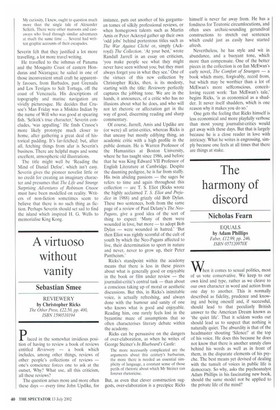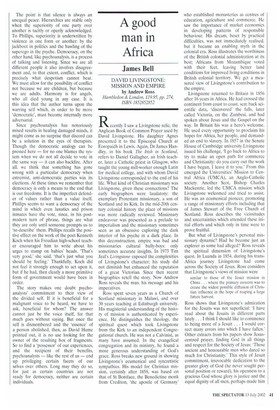The harmony of discord
Nicholas Fearn
EQUALS by Adam Phillips Faber, £12.99, pp. 246, ISBN 057120970X
hen it comes to sexual politics, most of us vote conservative. We keep to our own kind and type, rather as we cleave to our own character in word and action from one day to another. This is normally described as fidelity, prudence and knowing and being oneself and, if successful, should lead to that peculiarly British answer to the American Dream known as 'the quiet life'. That it seldom works out should lead us to suspect that nothing is naturally quiet. The absurdity is that of the headmaster shouting 'Silence!' at the top of his voice. He does this because he does not know that there is another unruly class behind his words as well as in front of them, in the disparate elements of his psyche. The best means yet devised of dealing with the tumult of voices in public life is democracy. So why, asks the psychoanalyst Adam Phillips in his fascinating new book, should the same model not be applied to the private life of the mind? The point is that silence is always an unequal peace. Hierarchies are stable only when the superiority of one party over another is tacitly or openly acknowledged. To Phillips, superiority is underwritten by violence in one form or another: by the jackboot in politics and the bawling of the superego in the psyche. Democracy, on the other hand, like psychoanalysis, is a process of talking and listening. Since we are all different people it also involves disagreement and, to that extent, conflict, which is precisely what despotism cannot bear. We must allow for the possibility of conflict not because we are children, but because we are adults. Harmony is for angels, who all died young in any case. It is this idea that the author turns upon the warring self which, in order to be more 'democratic', must become internally more adversarial.
Since psychoanalysis has notoriously mixed results in healing damaged minds, it might come as no surprise that discord can be a solution in the eyes of therapists. Though the democratic analogy can be pressed here — for no one blames the system when we do not all decide to vote in the same way — it can also backfire. After all, we think that something has gone wrong with a particular democracy when extremist, anti-democratic parties win its elections. At these times we remember that democracy is only a means to the end that is our freedoms. It is the imperfect defender of values rather than a value itself. Phillips seems to want a democracy of the mind in which even lunatics and prison inmates have the vote, since, in his postmodern turn of phrase, things are what they are only until someone prompts us to 're-describe' them. Phillips recalls the positive effect on the work of the poet Kenneth Koch when his Freudian high-school teacher encouraged him to write about his urges to stamp on babies' heads. 'That's very good,' she said, 'that's just what you should be feeling.' Thankfully, Koch did not feel it strongly enough to act upon it, but if he had, then clearly a more primitive form of government would have been in order.
The story makes one doubt psychoanalysts' commitment to their view of the divided self. If it is beneficial for a malignant voice to be heard, we have to ask, beneficial for whom? The answer cannot just be the voice itself, for that much goes without saying. But once the self is dismembered and the 'essence' of a person abolished, then, as David Hume pointed out, it is no use looking for the owner of the resulting box of fragments. So to find a 'possessor' of our experiences, and the recipient of their benefits, psychoanalysts — like the rest of us — end up privileging certain facets of our selves over others. Long may they do so, for just as certain countries are not ready for democracy, neither are certain individuals.



































































 Previous page
Previous page